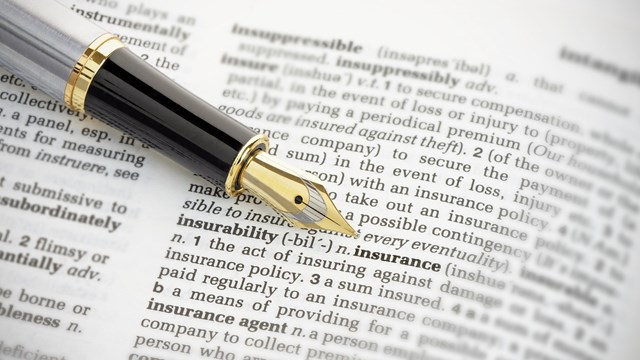Surprise. Surprise. The major storm events we’ve experienced in New England may give condo owners and trustees a very good reason to look at the insurance coverage for all of their association properties. While protection for major incidents like flooding is important, more mundane issues like adequate overall coverage are also important.
While most unit owners, trustees and board members have a good grasp of the major insurance coverages they are paying for to protect their buildings and property (such as homeowners, liability and umbrella) other, more specialized types of insurance are also items to learn something about. Some of these coverages could be valuable, or even essential, for trustees and board members to understand. After all, they have an obligation to be the fiduciary watchdogs of the community.
Some unit owners, unfortunately, are even unaware they need an HO6 policy, believing that the association’s master policy will give them complete protection. Jeff Grosser, vice president of Rodman Insurance Company in Needham, Massachusetts, says, “When I attend meetings with unit owners, I’ll ask, ‘who doesn’t have an HO6 policy?’ and a few hands will be raised.”
Condo owners need to know what’s in the association’s master policy and what is not, so as to ensure adequate coverage for their units. Brendon Kilcoyne, CIC, at H&K Insurance Agency in Watertown, Massachusetts, has been selling condo insurance for the past 10 years. He points out that there are two ways of writing a master policy; a ‘named perils’ policy and an ‘all perils’ policy. “The named perils policy lists the perils that are covered, and everything else is excluded. The all perils policy covers all perils unless they are explicitly excluded,” he says. While most companies write an all perils policy, Kilcoyne points out that even that policy excludes earthquakes, floods, vermin, termites, bed bugs and squirrels getting into the wiring.
When Disaster Strikes
Some associations may purchase a separate policy for floods and an endorsement for earthquakes, while the other issues are typically up to the unit owner to decide whether to obtain coverage. “Most of Massachusetts is in an earthquake zone,” says Kilcoyne. “We had one in Maine last year and another in Connecticut in 2011.” Grosser says earthquake riders for condos vary from company to company and generally range from $20-$100.
Experts recommend that unit owners fully insure their properties against flooding by buying extra insurance through Federal Eergency Management Agency. This cannot be done soon enough, if the added coverage is truly needed. Like it or not, you can’t get flood insurance the day before you get the big rain; there’s a 30-day waiting period.
But if you are way inland, and think flood coverage shouldn’t matter, think again. Just about everyone lives in a flood zone, the experts say. Twenty percent of flood claims are paid to those in low to moderate-risk areas. Just because you’re in a low-risk zone does not mean it’s a no-risk zone. It’s worth noting, too, that if there is construction and development in your area, it will likely increase your building’s flood risk because the development creates more runoff.
“Flood insurance is a peril, like fire,” says Chris Snow, principal of Bernier and Snow, a division of Bernier Insurance, Inc., in Rochester, New Hampshire. About 95% of the company’s business is for condominiums in Massachusetts, New Hampshire, Maine and Rhode Island. “To obtain flood insurance, the building has to be in a municipality that qualifies for federal flood insurance. If the building is mortgaged, the bank will require flood insurance. If a unit owner obtains a policy, the average cost can be about $200.” Snow says that if the condo has a basement unit, it can be problematic since the federal flood policy will only include the mechanical equipment and unfinished sheetrock walls.
Grosser points out that many associations insure with an “all in policy” covering walls, floors, cabinets and other fixtures like wall-to-wall carpeting. “You need to be sure the HO6 and the association policy dovetail.”
Glenn Montgomery, owner of Brownstone Insurance in Norwell, Massachusetts, an independent insurance agency with 70% of its business in condominiums, says it’s important for unit owners to be aware that they might be responsible for the association’s deductible. “Deductibles can be as high as
$25,000, so they need to obtain an HO6 policy that can cover the deductible gap,” he says.
Are You Covered?
Personal contents are never covered by the master policy. “Unit owners should insure for replacement value, otherwise they will end up with depreciated value,” says Snow. Another reason for sufficient insurance for personal contents has to do with a risk often overlooked by condo owners: loss of use. In the cases of homes that have been severely damaged and are uninhabitable, homeowners’ policies may provide Loss of Use coverage, which provides reimbursement for lodging, food and other living expenses a homeowner could incur as a result of having to live outside his or her home for a time.
Meanwhile, property taxes and condo fees still have to be paid. Montgomery points out that a loss of use coverage on a typical policy is insured for 20% of the personal contents value. A standard $50,000 policy would provide $10,000 coverage for loss of use. While the contents coverage may be sufficient, the loss of use may run higher if the displacement is prolonged. “You can increase the percent without increasing the content coverage with an endorsement and save money,” says Montgomery. Loss of use coverage also reimburses the homeowner for any lost rental income, provided the homeowner is renting out part of their unit.
Another area in which unit owners are responsible is personal liability. ”Personal liability is never covered by the master policy, so it’s up to the unit owner to get coverage against someone slipping and falling in your unit,” says Grosser. “I recommend a personal liability policy of no less than $500,000. A personal umbrella policy can provide excess liability limits of up to $1,000,000,” including automobile liability, says Grosser.
Grosser points out that if a unit owner runs a business in the condo and clients come to the condominium, the owner needs business insurance. The condo owner’s policy does provide business liability insurance and very limited coverage for business property.
Protection against loss assessment is an area which should be covered by the unit owner’s policy, but condo owners need to be knowledgeable so as to insure their units if the policy limits on the master policy are not sufficient. A loss assessment is what the association assesses against all unit owners to pay for damages to the building not covered by the master policy, or inadequate liability insurance. Both Snow and Grosser recommend unit coverage of $50,000. Grosser estimates a loss policy will cost a unit owner about $5 to $10.
Protection against mold is an area that can only be covered in the master policy. According to Snow, coverage depends on the insurance company. “Some companies will set limits of $15,000, some will cover the full cost of a building, and some companies don’t provide coverage,” he says.
Other Messes
Sewer backup coverage is available for a nominal cost, and usually is just an additional premium. Most co-op and condo buildings don’t get this type of insurance, but they should.
One of the most undersold and overlooked policies for coverage by associations is worker’s compensation, according to Montgomery. “There can be liability issues for people hired to work on a condominium building,” says Montgomery. “If the company hired by the association doesn’t cover its employees, the association can be liable for injuries to uninsured workers.”
As the cost of condominium insurance increases due to recent severe weather and the economy, it will become more important for associations and condo owners to understand the various policy coverages and read the fine print. n
Leonard Golder is a freelance writer and a frequent contributor to New England Condominium.







Comments
Leave a Comment